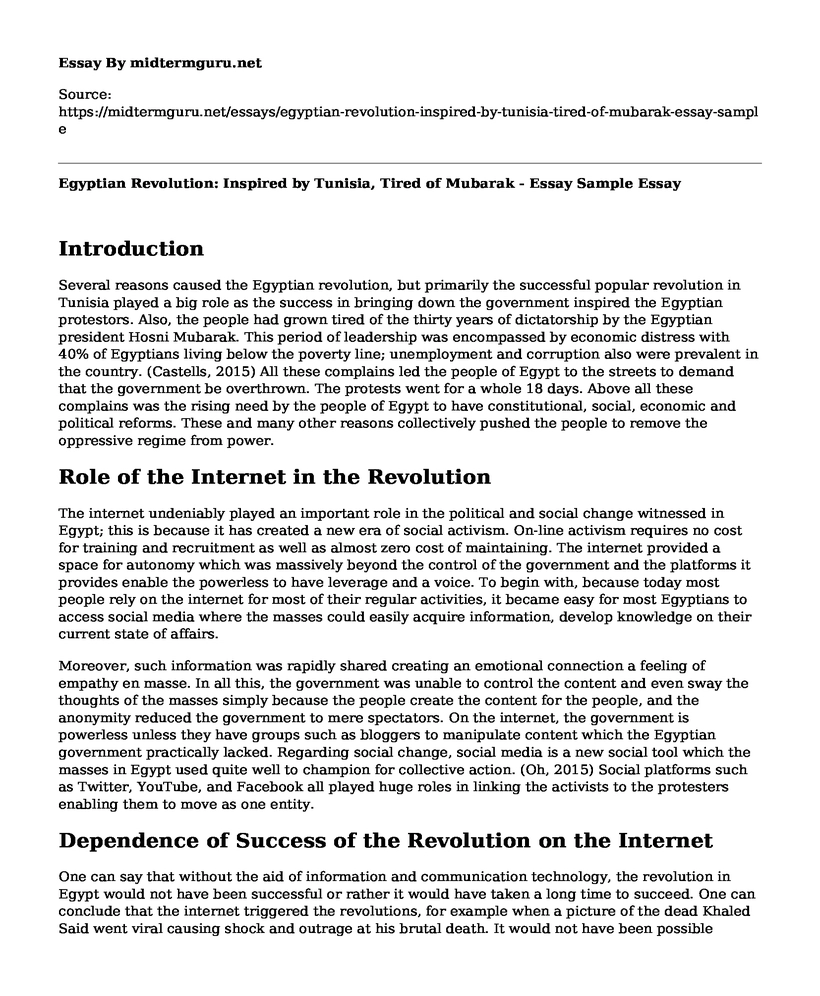Introduction
Several reasons caused the Egyptian revolution, but primarily the successful popular revolution in Tunisia played a big role as the success in bringing down the government inspired the Egyptian protestors. Also, the people had grown tired of the thirty years of dictatorship by the Egyptian president Hosni Mubarak. This period of leadership was encompassed by economic distress with 40% of Egyptians living below the poverty line; unemployment and corruption also were prevalent in the country. (Castells, 2015) All these complains led the people of Egypt to the streets to demand that the government be overthrown. The protests went for a whole 18 days. Above all these complains was the rising need by the people of Egypt to have constitutional, social, economic and political reforms. These and many other reasons collectively pushed the people to remove the oppressive regime from power.
Role of the Internet in the Revolution
The internet undeniably played an important role in the political and social change witnessed in Egypt; this is because it has created a new era of social activism. On-line activism requires no cost for training and recruitment as well as almost zero cost of maintaining. The internet provided a space for autonomy which was massively beyond the control of the government and the platforms it provides enable the powerless to have leverage and a voice. To begin with, because today most people rely on the internet for most of their regular activities, it became easy for most Egyptians to access social media where the masses could easily acquire information, develop knowledge on their current state of affairs.
Moreover, such information was rapidly shared creating an emotional connection a feeling of empathy en masse. In all this, the government was unable to control the content and even sway the thoughts of the masses simply because the people create the content for the people, and the anonymity reduced the government to mere spectators. On the internet, the government is powerless unless they have groups such as bloggers to manipulate content which the Egyptian government practically lacked. Regarding social change, social media is a new social tool which the masses in Egypt used quite well to champion for collective action. (Oh, 2015) Social platforms such as Twitter, YouTube, and Facebook all played huge roles in linking the activists to the protesters enabling them to move as one entity.
Dependence of Success of the Revolution on the Internet
One can say that without the aid of information and communication technology, the revolution in Egypt would not have been successful or rather it would have taken a long time to succeed. One can conclude that the internet triggered the revolutions, for example when a picture of the dead Khaled Said went viral causing shock and outrage at his brutal death. It would not have been possible without social media. (Poell, 2015) Governments and even corporates have become wary of the freedom of self-communication that makes up the autonomous realms of the internet. The coming together of the cyberspace and the physical spaces for demonstration created a hybrid which strengthened the mobilization and execution of the protests, without which the masses would not have moved with similar objectives, and it would have been easy to control such a demonstration. Without the internet, it would be more difficult to put pressure on the government to resign hence the more reason why castell put so much emphasis on the role of the internet in the revolution of the oppressive Egyptian regime. Previously several revolutions had been carried out successfully without using the internet but we are in different times, and the internet provides new and efficient ways of doing things. The amazing thing is that a single body cannot control online networks.
References
Castells, M. (2015). Networks of outrage and hope: Social movements in the Internet age. John Wiley & Sons.
Oh, O., Eom, C., & Rao, H. R. (2015). Research note-Role of social media in social change: An analysis of collective sense making during the 2011 Egypt revolution. Information Systems Research, 26(1), 210-223.
Poell, T., & Van Dijck, J. (2015). Social media and activist communication. Powell, Thomas & Jose van Dijck (2015). Social Media and Activist Communication. In The Routledge Companion to Alternative and Community Media, 527-537.
Cite this page
Egyptian Revolution: Inspired by Tunisia, Tired of Mubarak - Essay Sample. (2023, Jan 11). Retrieved from https://midtermguru.com/essays/egyptian-revolution-inspired-by-tunisia-tired-of-mubarak-essay-sample
If you are the original author of this essay and no longer wish to have it published on the midtermguru.com website, please click below to request its removal:
- Form a Public Sector Comparator (PSC) - Essay Example
- Policy Paper: Reducing High Rates of Incarceration in the United States
- Essay Sample on Strategies Employed by White Settlers to Legitimately Occupy Indian Land
- Virtual Team Management - Research Paper
- Hypertension: Myocardial Structural Changes and Cardiac Dysfunctions - Research Paper
- Digital Age: Impact on Democracy in the 20th Century - Essay Sample
- Equal Employment: Overcoming Racism, Homelessness to Achieve Success - Essay Sample







